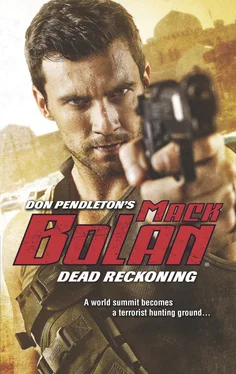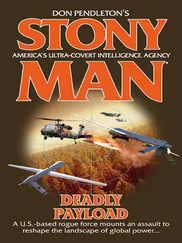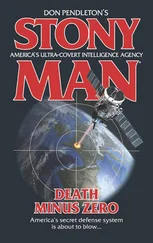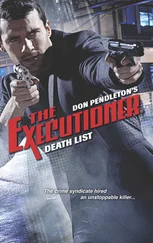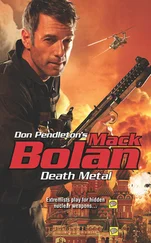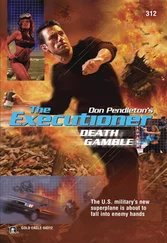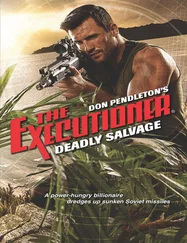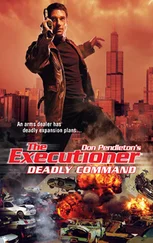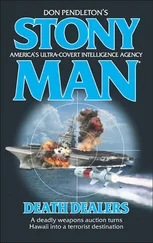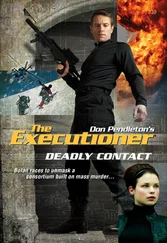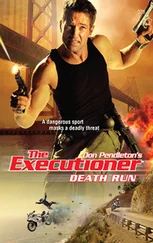Grimaldi reached him, kicked his little SMG aside and crouched beside the dying terrorist. The pilot spoke English, Italian and a little Spanish, so he went with English first.
“You’re dying,” he informed the fallen gunman. “Do your soul a favor while you can. Tell me where I can find your buddies from the raid in Jordan.”
The shooter’s eyes were fading in and out of focus with the pulse of blood from open lips. Grimaldi wasn’t sure the guy could speak at all, but something came out, sounding like “Elif air ab tizak!” The way he smirked, despite his pain, told Grimaldi it hadn’t been a compliment.
And then, he died.
* * *
ABDULLAH RAJHID WAS WINDED, but he could not stop to catch his breath. Two men had chased him from the four-story apartment building, along with Khamis and Farsoun. One of them had pursued Farsoun when he broke ranks and fled across the street, a panicked move that nonetheless had helped Rajhid by splitting up their enemies. He’d tried to do the same again—and save himself—by sending Khamis east while he turned west at the next intersection, but the ploy had failed.
He was alone now, with an enemy behind him, closing in.
The MAC-10 underneath his belt was chafing, gouging Rajhid, but he could not pull it out in public, running down the sidewalk with the weapon in his hand. That would be desperate, a last resort, and only useful if he had a chance to kill his adversary with the first rounds from his small machine pistol.
If he was forced to use the gun with witnesses around, it did not matter who else fell, as long as Rajhid dropped his man and ended the insane pursuit. Beyond that, if his past experience was any guide, a blaze of gunfire on a busy street would shock and terrorize most workaday pedestrians and buy Rajhid enough time to escape on foot.
Where would he go?
There was another place in Ciudad del Este, operated by Hezbollah, though his brethren might not be pleased to see him after what had just occurred at their so-called secure facility. Police were probably swarming around the shooting scene by now, exposing things that Rajhid’s hosts would not appreciate.
It could be death, returning to their company—but at the moment, in this foreign land, he had no other choice.
Kill first, he thought. Then run and hide.
But first, if possible, he had to spot a likely murder site.
Not murder, he corrected. Self-defense.
He needed cover. Not a lot, but ample for a brief exchange of fire in case his first shots failed to do the trick. A drawn-out duel would be the death of him, no matter what his adversary’s fate. With cell phones all around him, someone— many someones—would alert police, bringing them down on top of him with sirens whoop-whoop-whooping like demented banshees.
That would be the end. A martyr’s death, of course, but not the one Rajhid envisioned for himself.
He still had plans for the jihad .
The cross street he had chosen was a kind of outdoor market, with stalls under awnings positioned outside stores. Its barely orchestrated chaos made him feel at home, reminding him of marketplaces where his mother used to shop, where he had run and played in childhood, still oblivious to all the perils of the world. Rajhid could pick out any stall and duck behind it for a moment, turn and—
Yes! the voice inside his head ordered. Stop wasting time!
* * *
MACK BOLAN SAW the changeup coming, read his target’s body language when the runner nearly glanced behind his shoulder, then resisted at the final instant. Breaking to the right meant running into traffic, no percentage there, but there were stalls and stores along the whole block to his left.
And left it was, a pivot in midstride, and Rajhid of the red shirt dropped from sight. Bolan slowed but didn’t halt his forward motion, just in case the Saudi had a bluff in mind, stalling pursuit with fear of gunfire, while he wriggled clear behind the outdoor stalls. It might have fooled somebody else, if that was what he had in mind, but not the Executioner.
Most definitely not this day, with so much riding on the line.
Bolan closed in at walking speed, ready to peel off left or right, depending on what happened in the next few seconds.
When it came, however, Bolan was surprised.
It started with a squeal. The woman selling used books from the stall where Rajhid had concealed himself let out the cry, as Rajhid sprang erect and whipped an arm around her throat, clutching her as a human shield. His weapon—a MAC-10 or MAC-11, unmistakable—was pressed against her head, its stubby muzzle in her ear. At that range, if Rajhid fired, he would blind himself with brain and bone fragments, but that would be no consolation to the woman he’d have killed.
Bolan already had the Steyr at his shoulder, half of Rajhid’s face framed in the reticle of his integrated telescopic sight. Rajhid was stuck there, obviously knowing that the only way to hide his face completely was to lose sight of his enemy.
“Put down the gun and you can walk away from this,” Bolan said, lying through his teeth.
“Put down your gun,” Rajhid replied, “and you can—”
Bolan’s bullet drilled Rajhid’s forehead just above his right eye. The 5.56 mm bullet left a tidy entrance wound, then tumbled through the man’s brain, yawing after it cleared the bony barrier of his frontal bone and found soft tissue. Dead before the impact registered, Rajhid slumped over backward, still clutching his female hostage as he fell.
Bolan was on the pair of them in nothing flat, released the woman from Rajhid’s dead grasp and plucked the subgun from his other hand. No questions would be answered here, but Bolan did his best under the circumstances, patting Rajhid’s several pockets, locating a compact satellite phone first and then a regular cell phone. He claimed both, then kept digging until he found a bulging wallet, while a group of cautious rubberneckers started edging closer.
Time to go.
Rising, he tucked the Steyr out of sight beneath his raincoat, left the stall with no attempt to hide his face and walked away. An alley beckoned to his left, and Bolan ducked in there, then sprinted down past its stinking garbage cans to reach another cross street, operating from a street map of the city he had memorized beforehand.
How long before police arrived to check out Rajhid’s corpse and start interrogating witnesses? The apartment-building battleground should distract most of them for a while. With any luck, enough time for him to regroup with Grimaldi and clear the scene.
When he was on the next street over, strolling with the flow, Bolan fished out his cell phone and pressed the button for Grimaldi’s number. Two rings in, he heard his voice.
“I blew it,” the Stony Man pilot confessed, without preliminaries. “Got the shot, but came up empty-handed.”
“Nearly the same for me,” Bolan replied, “but I’ve got two phones and a wallet.”
“Could be helpful,” Grimaldi said.
“Fingers crossed. I’ll meet you at the car in five.”
CHAPTER FOUR
Walid Khamis sat and watched the Hezbollah fighters conferring in the dining room, just out of earshot from the sofa where they’d ordered him to sit and keep his mouth shut. They were angry, obviously, seeking ways to blame him for the raid on their apartment building, but he did not intend to stoke that anger by admitting the attack might well have been, in fact, his fault.
Not his specifically, of course, but all of theirs, his comrades and himself. He sat and wondered if the others, Rajhid and Farsoun, were even still alive.
Upon arrival in the city, when the Hezbollah team had grudgingly accepted them, Khamis and his companions had been warned against leaving the four-story apartment building. If they managed to forget that simple rule, or were forced out somehow and got lost, they’d been provided with an alternative address, the house in which he now sat, waiting for these strangers to decide his fate.
Читать дальше
